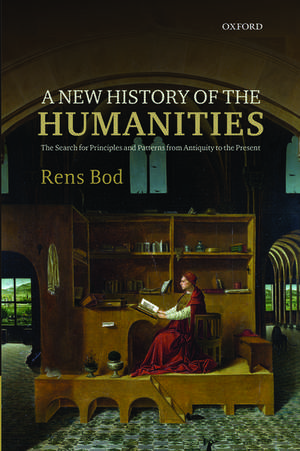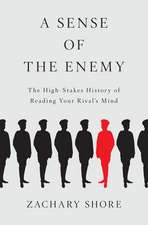A New History of the Humanities: The Search for Principles and Patterns from Antiquity to the Present
Autor Rens Bod Traducere de Lynn Richardsen Limba Engleză Hardback – 14 noi 2013
| Toate formatele și edițiile | Preț | Express |
|---|---|---|
| Paperback (1) | 263.75 lei 10-16 zile | +89.28 lei 5-11 zile |
| OUP OXFORD – 12 noi 2015 | 263.75 lei 10-16 zile | +89.28 lei 5-11 zile |
| Hardback (1) | 661.00 lei 31-37 zile | |
| Oxford University Press – 14 noi 2013 | 661.00 lei 31-37 zile |
Preț: 661.00 lei
Preț vechi: 759.26 lei
-13% Nou
Puncte Express: 992
Preț estimativ în valută:
126.52€ • 137.48$ • 106.35£
126.52€ • 137.48$ • 106.35£
Carte tipărită la comandă
Livrare economică 10-16 aprilie
Preluare comenzi: 021 569.72.76
Specificații
ISBN-13: 9780199665211
ISBN-10: 0199665214
Pagini: 400
Ilustrații: 14 black and white images
Dimensiuni: 162 x 237 x 30 mm
Greutate: 0.75 kg
Editura: Oxford University Press
Colecția OUP Oxford
Locul publicării:Oxford, United Kingdom
ISBN-10: 0199665214
Pagini: 400
Ilustrații: 14 black and white images
Dimensiuni: 162 x 237 x 30 mm
Greutate: 0.75 kg
Editura: Oxford University Press
Colecția OUP Oxford
Locul publicării:Oxford, United Kingdom
Recenzii
A New History of the Humanities amounts to a persuasive plea to give Panini, Valla, Bopp, and countless other often overlooked intellectual giants their rightful place next to the likes of Galileo, Newton, and Einstein.
an extraordinarily ambitious undertaking... What Bod has written is not just a "new" history. It is the first ever history of its kind.
The telos of his book is not just to write a story, but to make a case for the humanities as a discipline of progress
Bod's work did create a big sensation not only in the academic scene but also in the public and major newspapers in the Netherlands, England, and more generally Western Europe. Not only did he accomplish something that has not been done before, namely, a written history of the humanities, but he also takes a perspective to this enterprise that redefines the role of the humanities especially in relation to the natural sciences.
Bod's book is designed as an opening salvo in a grand project to develop the history of the humanities as a subfield on par with (and potentially in close alliance with) the history of science, with a view to building a history of knowledge-making more generally ... Bod's energetic initiatives are a fine example of the shifting categories of research
Too often humanities scholars believe that they are moving toward science when they use empirical methods, Bod reflected. They are wrong: humanities scholars using empirical methods are returning to their own historical roots in the studia humanitatis of the 15th century, when the empirical approach was first invented.
Bod convincingly shows that since antiquity there have existed lines of humanistic investigation that have pursued the search for general laws governing the functioning of language, of texts or of history, very similar to the natural sciences.
Bod takes the humanities back to their rightful place in the family tree of sciences.
Bod's effort has become a reason for debate and interdisciplinary encounters among different scholars who agree that the 'disunity' of the sciences, which is commonplace in the post-positivist epistemological era, does not necessarily mean disunity of culture.
The current handwringing and doomsaying in academia concerning the study of humanities and its support, especially in the United States, makes Rens Bod's book not only an interesting read, but also timely and ambitious.
In case anyone reading this review is not yet impressed, the author takes care, under each heading, to discuss developments not just in Europe but also (when appropriate) in India, China, and the civilization of Islam. The result is undeniably impressive -- and hugely informative.
an extraordinarily ambitious undertaking... What Bod has written is not just a "new" history. It is the first ever history of its kind.
The telos of his book is not just to write a story, but to make a case for the humanities as a discipline of progress
Bod's work did create a big sensation not only in the academic scene but also in the public and major newspapers in the Netherlands, England, and more generally Western Europe. Not only did he accomplish something that has not been done before, namely, a written history of the humanities, but he also takes a perspective to this enterprise that redefines the role of the humanities especially in relation to the natural sciences.
Bod's book is designed as an opening salvo in a grand project to develop the history of the humanities as a subfield on par with (and potentially in close alliance with) the history of science, with a view to building a history of knowledge-making more generally ... Bod's energetic initiatives are a fine example of the shifting categories of research
Too often humanities scholars believe that they are moving toward science when they use empirical methods, Bod reflected. They are wrong: humanities scholars using empirical methods are returning to their own historical roots in the studia humanitatis of the 15th century, when the empirical approach was first invented.
Bod convincingly shows that since antiquity there have existed lines of humanistic investigation that have pursued the search for general laws governing the functioning of language, of texts or of history, very similar to the natural sciences.
Bod takes the humanities back to their rightful place in the family tree of sciences.
Bod's effort has become a reason for debate and interdisciplinary encounters among different scholars who agree that the 'disunity' of the sciences, which is commonplace in the post-positivist epistemological era, does not necessarily mean disunity of culture.
The current handwringing and doomsaying in academia concerning the study of humanities and its support, especially in the United States, makes Rens Bod's book not only an interesting read, but also timely and ambitious.
In case anyone reading this review is not yet impressed, the author takes care, under each heading, to discuss developments not just in Europe but also (when appropriate) in India, China, and the civilization of Islam. The result is undeniably impressive -- and hugely informative.
Notă biografică
Rens Bod is a professor of humanities at the University of Amsterdam. He is the initiator of the conference and book series The Making of the Humanities (2008, 2010, 2012). Among his other books are Beyond Grammar (1998), Probabilistic Linguistics (2003), Data-Oriented Parsing (2003) and the Dutch monograph De Vergeten Wetenschappen (The Forgotten Sciences, 2010) which was translated into four languages.










